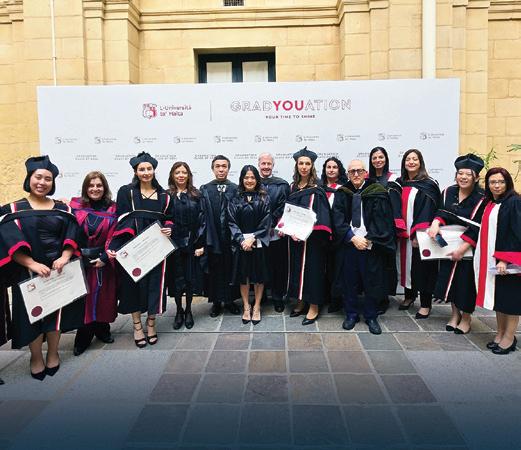
8 minute read
Pharmacy Without Borders
The UIC Retzky College of Pharmacy and the University of Malta celebrate a decade of collaboration advancing pharmacy education, practice, and research as well as global healthcare.
In mid-March, UIC Retzky College of Pharmacy faculty members Dr. Alan Lau, Dr. Andrew Donnelly, and Dr. Jennifer Pham found themselves more than 5,000 miles away from their Chicago homes and in an especially festive mood.
The UIC trio gathered with colleagues from the University of Malta to celebrate the 10-year anniversary of the collaborative Doctorate in Pharmacy program, a lively international partnership producing benefits for faculty, students, and researchers at both academic institutions.

Since UIC faculty helped their Malta counterparts launch the doctorate program in 2014, more than 100 University of Malta students representing 23 countries have completed their studies and transitioned into professional roles around the world. Through additional initiatives, including faculty development and joint scholarly activities, the two institutions have further enlivened their partnership as well as pharmacy education, practice, and research to propel both the profession and global healthcare.
“This has been a friendly, warm relationship with a group of colleagues who share our vision to advance practice and research and positively impact the next generation of pharmacists,” confirms Lau, professor of pharmacy practice and director of International Clinical Pharmacy Education at the Retzky College of Pharmacy.
AN ENTERPRISING INTERNATIONAL PARTNERSHIP
UIC’s relationship with the University of Malta begins more than 15 years ago with former UIC Pharmacy Dean Dr. Henri Manasse. At the 2009 American Society of Health-System Pharmacists’ Midyear Clinical Meeting in Las Vegas, Manasse pulled Lau into a conversation with faculty from the University of Malta.
There, leaders from the European university’s Department of Pharmacy outlined their vision for a doctorate program blending pharmacy practice and research. They also detailed their most pressing need, namely support from an academic partner with proven excellence in pharmacy health systems as a platform to intensify knowledge, people-centered practice, and innovative research. UIC seemed an ideal companion and Malta leaders asked for assistance. It would be a mighty task, both parties acknowledged, yet one with compelling potential.
“But what do people do in Vegas? They gamble, right?” Lau asks. “We took a gamble ourselves.”
Over the next four years, after the initial collaboration framework had been completed, Pham spearheaded the creation of the design and contents of the doctorate program alongside Dr. Lilian M. Azzopardi, head of the University of Malta’s Department of Pharmacy. The leaders visited each other’s campuses, analyzed existing courses and strengths, identified gaps, and defined program parameters.
To launch the doctorate program in 2014, UIC shared teaching materials and resources and provided access to faculty. The University of Malta, for instance, did not have advanced practice courses covering specialty areas like pharmacotherapy, so UIC provided up to 140 hours of recorded lectures in addition to real-time case recitation with UIC faculty.

UIC’s commitment stimulated the upstart program’s growth, which quickly captured the attention of aspiring pharmacists from Malta as well as nations across Europe, Asia, and Africa. Within five years, 76 students representing 18 different countries had enrolled in Malta’s doctorate program.
An earnest partner, UIC has continued to evolve its support of its Maltese colleagues, too. Pham, for instance, has grown the number of UIC faculty lending their expertise to the program, which has pushed the University of Malta’s curriculum into increasingly relevant areas like pharmacotherapy, pharmacoeconomics, and drug safety. UIC faculty have also visited Malta to help their international colleagues elevate instruction and training as well as clinical practice.
Azzopardi credits UIC’s allyship for helping the University of Malta deliver a well-defined and distinct post-graduate Doctorate of Pharmacy program, one that has sharpened its students advanced practice skills, enhanced their critical thinking for patient-centered care, and powered their ability to execute changes in pharmaceutical services across various healthcare settings. In addition, Azzopardi notes, the UIC team brings expertise in clinical pharmacy practice in diverse specialties, such as infectious diseases, cardiology, oncology, pediatrics, and transplant, to expand the Malta students’ training and knowledge base.
ADVANCING THE RELATIONSHIP
UIC’s partnership with the University of Malta extends beyond the classroom.
When Pham, clinical associate professor in the Department of Pharmacy Practice and coordinator for collaborative international degree programs at the Retzky College of Pharmacy, visited Malta years back and completed rounds in a hospital, she realized Malta students could benefit from more hands-on experience. She responded by arranging for Maltese students to visit UIC for short-term clinical rotations. To date, about a dozen Malta students have come to Chicago for clinical training, including Dr. Valerie Ariane Rivera, who earned her Doctorate of Pharmacy from the University of Malta in March.
This partnership has expanded and strengthened our network of international collaborations and opened new doors for improved pharmacy education, research, and practice.
Rivera’s time at UIC included an internal medicine rotation with Dr. Hailey Soni and a neonatal ICU rotation with Pham. After graduation, Rivera transitioned into a community pharmacy setting. She says the insights she gained during her UIC rotations have proven “particularly crucial in the provision of seamless care intended for a coordinated and integrated method of healthcare provision.”
In addition, UIC faculty members have initiated training programs for both Malta students and faculty, often covering topics around disease education and clinical practice, collaborated on research projects, and introduced Malta personnel to colleagues in UIC’s other health sciences colleges to unlock additional learning and research opportunities. Lau, Pham, Dr. Sheila Allen of UIC’s Department of Pharmacy Practice, and American College of Clinical Pharmacy executive director Michael Maddux, a former UIC Pharmacy faculty member, also steered the creation of a preceptor training program for Malta faculty in conjunction with the American College of Clinical Pharmacy.
“We’ve helped to transform the University of Malta’s pharmacy education, enhance their clinical practice, and develop their students and faculty, which we can be incredibly proud of,” Lau says.
Azzopardi confirms the benefits of the ongoing partnership with UIC, crediting it for contributing to a more robust academic environment at the University of Malta. The collaboration has empowered the university’s students and alumni to design and improve pharmaceutical service models in Malta and in the many countries around the world in which the Malta graduates now practice.
“UIC presents outstanding clinical faculty who effectively transmit their passion towards excellence in patient care and visionary leadership towards rigorous pharmacy education, practice, and research within a dynamic international outreach,” Azzopardi says.
EXPLORING ADDITIONAL OPPORTUNITIES
To be certain, UIC has reaped benefits from the international relationship as well. Most notably, the active, decade-long partnership with the University of Malta has broadened the Retzky College of Pharmacy’s international exposure and influence. In bringing its faculty expertise and reputation to Malta, UIC has solidified its global position as a leader in innovative methods of clinical pharmacy education and research. Yet more, Azzopardi, a past president of the European Association of Faculties of Pharmacy, has helped UIC connect with universities in Europe and grow its connections within the International Pharmaceutical Federation (FIP).
“This partnership has expanded and strengthened our network of international collaborations and opened new doors for improved pharmacy education, research, and practice, which is incredibly energizing,” Lau says.
Over the last decade, collaboration and trust between the two institutions has become deeper, stronger, and leaders at both UIC and Malta are excited by what the future might bring. There is mutual interest in advancing research connections, including getting Malta student researchers involved with UIC mentors to conduct projects, as well as further developing the doctorate program, which can serve as a model for partnerships with other universities around the world. There is also shared interest in building a network of international partners, perhaps even creating a forum to share experiences and resources, to fuel positive movement in global pharmacy education and practice.

“The relationship looks at spreading further the opportunity for innovative post-graduate education for pharmacists in clinical aspects internationally and evolve to include post-doctorate scholarly endeavors that lead to bringing transformation in the healthcare landscape,” Azzopardi says.
Lau and Pham, meanwhile, hope to create more opportunities for UIC Pharmacy students to pursue clinical rotations in Malta. Thus far, two UIC Pharmacy students have undertaken rotations in Malta in areas of pharmaceutical regulation and patient safety – an area of excellence in pharmacy education and practice in the European nation—thanks to contributions from University of Malta professor Anthony SerracinoInglott. Gaining exposure to pharmacy practice in a different part of the world, Pham says, can provide UIC students unique insights into the profession and diverse perspectives on key practice areas such as pharmacovigilance and safety.
“It can be a real eye opener for students to see how pharmacy plays out in a different environment,” Pham says.
In particular, Lau touts Malta’s unique community pharmacy practice as a wonderful learning opportunity for UIC students and faculty alike. In Malta, a small country absent a large, anchor city and peppered with modestly sized towns, community pharmacists serve a critical role in the nation’s healthcare system, one akin to U.S.-based pharmacists located in rural settings. Maltese pharmacists are often their community’s first call when a medical issue arises, and many have rooms set aside in their facilities for physicians to see patients.
“There’s so much we have learned from each other over the past decade, yet so much more we can discover together,” Lau says of the UIC-University of Malta partnership. “It’s been a beneficial relationship thus far and something we look forward to building more in the years ahead.”

